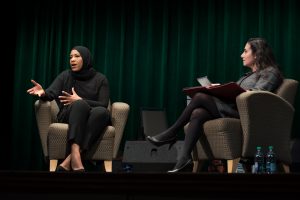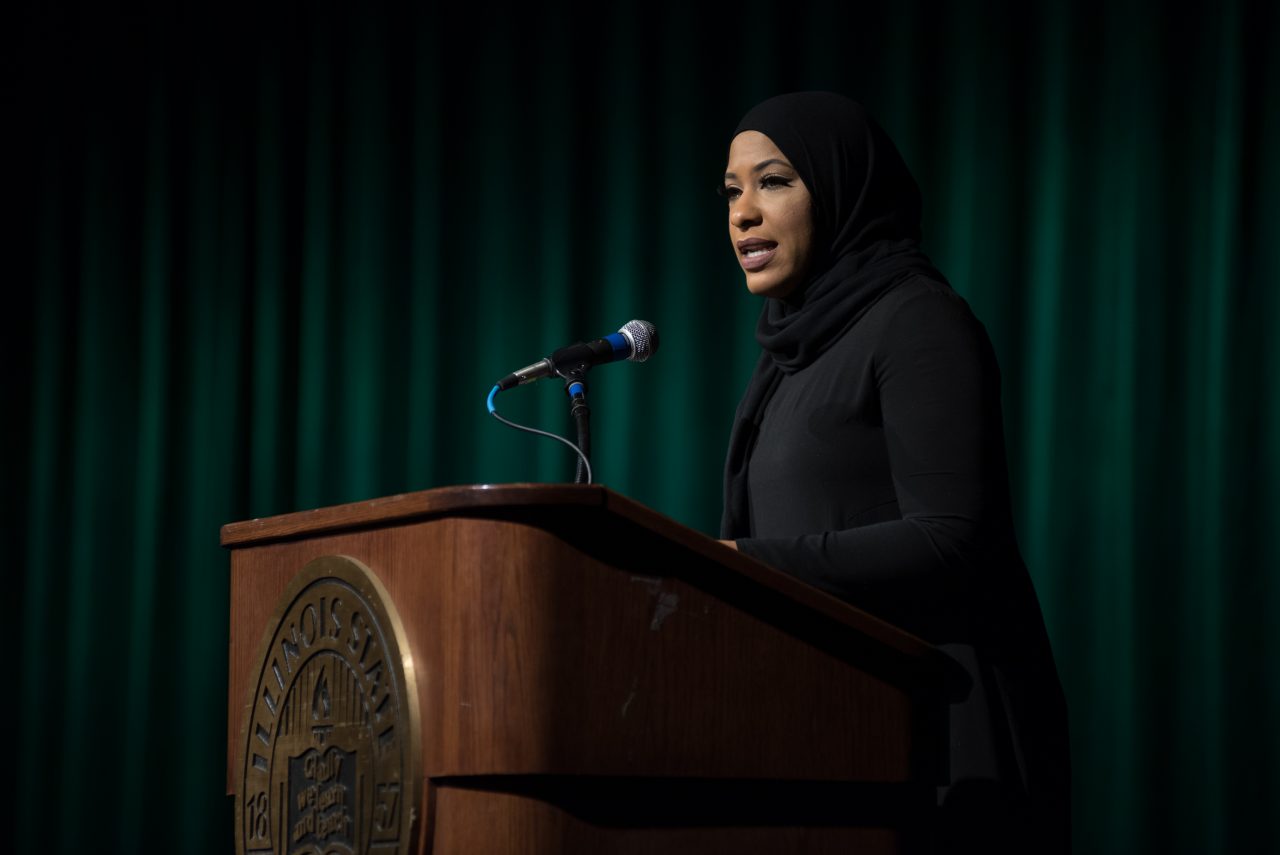For Olympic medalist Ibtihaj Muhammad, fencing was a way to consolidate her different identities and turn them into power.
“When I put the mask on, it wasn’t about being a girl, or being black, or being a Muslim. It was about being the best I can be,” she said.
Muhammad spoke at Illinois State University’s first Muslim Cultural Dinner, held Wednesday, April 3, in Bone Student Center’s Brown Ballroom. Muhammad won a bronze medal at the 2016 Summer Olympics in Rio de Janeiro and was the first Muslim-American woman to compete wearing a hijab. Her speech was the capstone of a night where Muslim music, food, and cultural perspectives were presented to approximately 200 students, faculty, and community members.
Muhammad spoke about her journey from her childhood home in Maplewood, New Jersey, to the podium at the Olympics. Her parents wanted Muhammad to pursue athletics, so she participated in various sports before settling on fencing, as it was easier to wear her hijab while competing.
While attending Duke University, she made plans to become a lawyer. However, she was driven to continue competing as a fencer after learning there were no black women on the National Women’s Saber team. Muhammad spoke candidly about the difficulties she faced as a black Muslim woman in the sport and how she was able to overcome them to compete at the highest level.
“I always tell young people, and girls in particular, to believe in their own journey and not allow anyone else to dictate it for them,” she said. “Once you know what your goals are, don’t wait for anyone’s permission. Totally commit to what you are looking to do and believe in its possibility.”
After her prepared remarks, Muhammad responded to audience questions during a session moderated by Associate Provost Ani Yazedjian. Muhammad spoke extensively about her training regimen during her days as a competitor and her decision to step away from fencing in 2017 to focus on writing her memoir, Proud: My Fight for an Unlikely American Dream. During this time she also started her business Louella, which strives to provide modest, fashion-forward clothing. Muhammad told the audience she had no further Olympic aspirations and wants to focus on inspiring others, especially in this political climate.

Ibtihaj Muhammad takes questions from the audience during a session moderated by Associate Provost Ani Yazedijan.
Muhammad was introduced to the stage by Illinois State junior and Muslim Student Association (MSA) President Mohammed Zaman.
“We felt it was a great way to bring someone who is empowering and very influential to the Muslim faith in the United States and around the world,” he said. “She gave us a voice as Muslim students but also a sense of contentment. We should be thankful for who we are as individual people.”
Graduate student and MSA member Fatima Mohammed said events like the Muslim Cultural Dinner are important for Redbirds to recognize their differences only make the campus community stronger.
“It is very important that we recognize the different people around us, so we learn more about them and appreciate our differences,” she said. “As humans we are all similar, but the little differences we have make us special. Events like this are great to share information, what you believe in, and your culture so people can appreciate you as you are.”
University Housing Services organized the Muslim Cultural Dinner in partnership with Event Management, Dining and Hospitality; the Association of Residence Halls; Watterson Area Government; the Watterson Diversity Coalition; and the Muslim Student Association. This is the 96th Cultural Dinner held at Illinois State since the program began in 1988.

